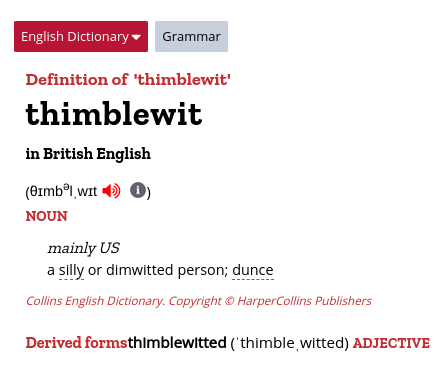what is the personality trait for someone that can't think fast, slow learner. Writing down a character is slow sounds ok but is there any other way i could describe my story character
2 Answers
I think obtuseness may be a personal trait of your character
lacking quickness of perception or intellect.(AHD)
mentally slow
not sharp or pointed (Collins)
-
Halfwit; not the sharpest tool in the shed; the lights are on but nobody's home, might all serve to describe people who do not use their mental powers to full capacity. Commented Aug 11, 2015 at 7:48
The problem is, one can't be entirely sure what exactly you need. Both the title and your question start out with 'what is the personality trait...', but then you go on to say that it should describe 'someone that can't think fast, [who is a] slow learner, etc.' What isn't clear is whether the word should be a) impersonal, neutral, and purely neurological/psychiatric, or whether b) it should be simply negative. (And by the way, as noted in a comment, those aren't personality traits)
The one example you'd discounted, slow, is defined by Cambridge as an adjective referring to people who are "not very smart and do not understand or notice things quickly:"
That's nearly exactly what you're looking for, but you've discounted it, possibly due to its simplicity. So, here are some other words:
In case it's supposed to be academic:
Several words- moron, imbecile, idiot, retard, cretin, etc- formerly had scientific meanings, but much like dumb in the sense of mute, they've more or less lost that aspect of their meaning. Now, most of them are 'softer,' with the exception of retard, which is still offensive.
These terms have been replaced by intellectually disabled, which is defined by AAIDD.org as "a condition characterized by significant limitations in both intellectual functioning and adaptive behavior that originates before the age of 22."
Because it's a character, and we don't know the context, it's hard to know if this is what you're looking for. But if this is, indeed, a character who has a developmental condition, then intellectually disabled is probably the word to use, unless there's a specific neurological impairment that the character has- in which case, if it's relevant, you should specify it.
As for words that are plain old negative:
There's fool. A fool is "a person lacking in judgment or prudence," while a person who is foolish is "having or showing a lack of good sense, judgment, or discretion." (Merriam-Webster: 1,2)
A stupid person is, as Merriam Webster scathingly puts it, "slow of mind... given to unintelligent decisions [and] acting in an unintelligent or careless manner; [is] lacking intelligence or reason, [whose choices are] marked by or resulting from unreasoned thinking or acting."
But those are a little too generic. More useful, perhaps, would be members of the -witted family, which are somewhat more specific:
slow-witted, adj.: not smart and therefore slow to notice or understand things (Cambridge)
half-witted, adj.:stupid (Cambridge)
dim-witted, adj.:stupid (Cambridge)
(I'm a little disappointed with the people who write the definitions at Cambridge)
thick-witted, adj.: dull or slow of mind (Merriam-Webster)
There are some rarer ones too, comb through the list yourself here (not all of them are negative). The two most interesting ones are also included; I separated them because they're a little less common.
There's quarter-witted, defined by Merriam-Webster as "half as bright as a half-wit"
And there's thimble-witted, whose entry, bizarrely, looks like this:
 (From Collins- note the contradiction regarding where the word is used)
(From Collins- note the contradiction regarding where the word is used)
The reason I suggest using the -witted family is that they encompass the fact that the person is lacking in 'wits.' Wits, per Merriam-Webster, entail: "astuteness of perception or judgment...superior intellect...reasoning power...mental soundness [and] mental capability and resourcefulness."
A person without these qualities, who is lacking in them, is sort of the type of person that you've described, and the words from the -witted family do well to capture that.
